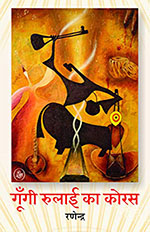‘Music is the shorthand of emotion. Emotions, which let themselves be described
in words with such difficulty, are directly conveyed to man in music, and in that is its power and significance.’
—Tolstoy
Ranendra’s is an important—and bold—signature in contemporary Hindi literature. As a novelist, who also happens to be a poet, he enters the landscape of his creation with nuanced, almost poignant, sensitivity to map the existential, ideological and, by extension, ontological contours within contemporary spaces. While in his earlier novels—Global Gaon ke Devta (2006) and Gayab Hota Desh (2014)—he had etched the excruciating reality of the tribals. In his latest novel, Goongi Rulaai ka Chorus (2021), he traces an altogether new strand of ‘marginality’, i.e., the gradual insulation and otherization of secular spaces in the wake of resurgent mainstreaming of oppositional world views. Triggered by ideological self-interests, these fast-emerging spatial reconfigurations—reinforced as they are by the mass mediated manipulations—threaten to dam the currents and crosscurrents of composite culture and history.

